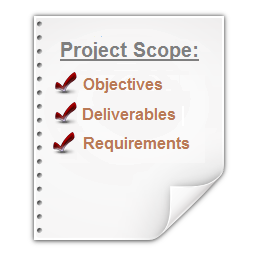Category: Project Implementation Guide
Evaluation planning is the final high-level process of the Project Setup phase to develop a comprehensive evaluation plan that explains how the project manager should plan for measuring the success of the project effort. Evaluation planning is necessary for making appropriate reviews and analysis of the project implementation process. The project manager in consultation with an advisory board and experts must create a plan for evaluating status and progress of the implementation process. This person will be responsible for information the key stakeholders on the progress through exchanging regular status reports and also the final project report.
Project governance roles are tools of the governance mechanism to ensure compliance with the implementation standards. The mechanism cannot be effective if there is no the relationships groups involved in the project. Roles of the project governance framework can be presented as a chart. Below in the picture, there are listed three project governance roles:
* Executive Sponsor(s)
* Steering Committee
* Project Manager/Director
As a project gets into the initiation phase, it requires an effective linkage mechanism that ensures alignment between the strategic project objectives and direction, and the path to planned outcomes over the implementation life-cycle of the project. In other words, such a mechanism must help sustain the project’s potential to deliver the stated benefits. Moreover, this mechanism must provide oversight and control over the project during the execution process. It must help managers and leaders to assess the project’s current progress and adjust content and direction to the objectives if necessary. The mechanism should also allow senior management to refine the definition of success and maintain alignment with the evolving project plan.
Regardless of the chosen approach and management strategies for implementing a project, there are always some alternative ways to implement the project using the same resource base and meeting the same business need. Such ways are called “project alternatives“. In the Initiation Phase, the identification and management of project alternatives will provide options for completing the project, while addressing the original business problem and delivering the expected business benefits.















